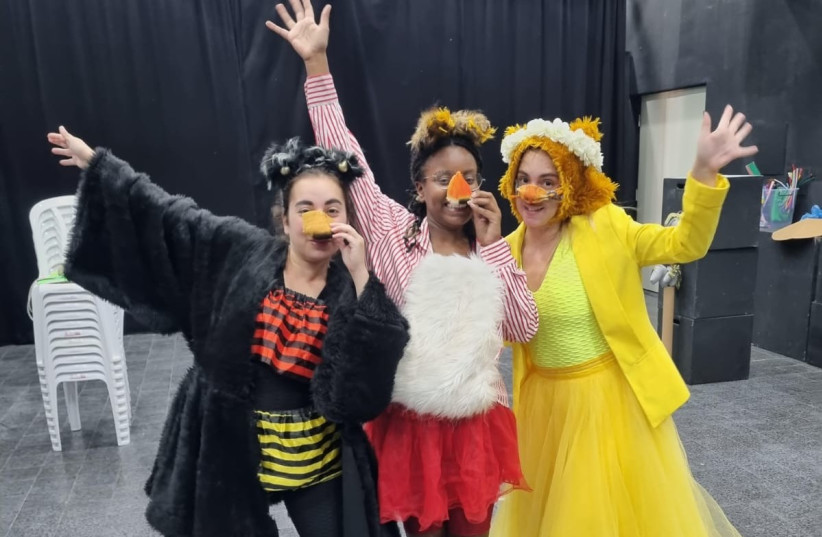Four child-oriented performances were produced from scratch during war conditions by the Tel Aviv University theater department students and faculty. The shows include classics like Aesop’s The Lion, the Bear and the Fox, The Frog Prince, and The Tale of the Fisherman, both by the Brothers Grimm. A short story by Nurit Zarchi called Croco Dancy, inspired the fourth production.
Zarchi’s story is about a girl-witch, Croco Dancy, who fails an examination in magic school. When instructed to conjure something that the world needs, “something strong, something swift, something to buy, something to gift,” her spells seem to backfire.

“In the Brothers Grimm version, the fisherman’s wife is controlling,” Silberg added, “she eventually desires to control the sun and the moon.” This is the twist that leads to her downfall as the wish-fulfilling goldfish refuses to comply and the fisherman and his spouse lose all they have gained.
“We chose to take this concept to a more childlike place of wonder,” Silberg told the Post, “a childlike rebellion against the natural order of things. Even when the tale ends and the wife and husband are back in their original state of poverty, they still love one another.”
Students were asked to offer ideas for wartime productions, explained Theater Department Head Dr. Dror Harari, and, like in a fable, things began to change.
“Suddenly there was a fresh vibe in the corridors,” he told the Post, “a new life, we secured a budget to support these productions and everyone gave a hand.”
Titled Fables in a Suitcase, the sets and props needed for each performance really do fit a single suitcase. Silberg came up with the concept and Abraham Benson-Goldberg, a fourth year student, and Dar Pikarski, a first year student, stepped up to the challenge.
Viewers who watch The Lion, the Bear and the Fox or The Frog Prince will see works directed by these two students. For Pikarski, who has not attended a single class yet as the school year has been postponed due to the war, this was a true trial by fire.
Special efforts were made to ensure the performances are suitable for evacuated families. Clinical psychologist Ronen Kowalski watched all performances and suggested how to “bypass points which might cause fears or traumas to resurface,” Harari explained.
For example, he pointed out, “not to use a specific shade of green in the set design,” as that particular color is used by Hamas for its flag.
In The Frog Prince, Silberg said, “there is an emphasis on the idea that inside each princess there is also a frog.”
In The Donkey in the Lion’s Skin, re-titled as Three Animals, the idea is that they are friends who are putting together a circus act. At first, they get in each other’s way and even try to sabotage what the other is doing, but eventually, they learn how to work together and be friends.
“One of the actors is also on reserve duty,” Silberg added, “so the rehearsals were scheduled to fit his needs. We are all dealing with losses during this war, and yet everybody is on board and the spirit of volunteering is breathtaking.”
Fables in a Suitcase offers four different family-oriented performances. Hebrew only. Each show is 30 minutes long. The performances are gratis.
To book, contact t.productionoffice@gmail.com.
Croco Dancy was translated to English by Leanne Raday, see: shortstoryproject.com/stories/croco-dancy/
